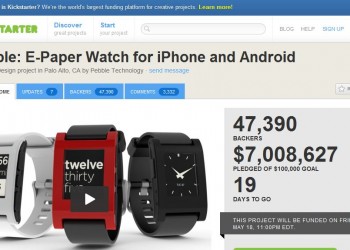For more expert crowdfunding advice, please see Part 1 of our guide to raising money online via Kickstarter, Indiegogo, RocketHub and more.
Q: How long should your crowdfunding campaign run?
A: Thirty days seems to be the magic number. You need time to see what’s resonating and fix what’s broken. Maybe your rewards or your creative campaign aren’t resonating. You need to be able to adapt on a dime. You need a game plan, but you also need to realize that no good plan survives first contact with the enemy.
Q: What should you do if you launch a campaign and it doesn’t resonate, or falls short of expectation?
A: Talk to your backers. Get their impressions. Nobody wants to see you succeed more than they do. Remember, you have the ability to change much of it on the fly. If your messaging doesn’t connect or your rewards don’t connect, you can always tweak it. If your video isn’t resonating or people keep asking questions about your pitch, post updates to answer the questions, or do outreach through email newsletters.
Think of your campaign as a series of battles in an ongoing war. It’s important to know upfront who you can call on for support, because you’re going to need to lean on your backers, partners, and friends and family.
Q: What types of rewards should I be providing?
A: You need a combination of physical merchandise or preorders and personalized, one-of-a-kind rewards, such as advance access to a beta program. It’s important to offer value at every level. This isn’t a charity fundraiser; people expect something in return for their money. Start at the impulse buy level – $5 or so – and go up to high-end, exclusive prizes. Have reasonably spaced-out [reward] tiers – don’t jump from $5 to $500 – so everyone has a chance to contribute. Have a mix of rewards, some designed to draw attention to your campaign or attract the big fish, and some designed to monetize. It’s also a good idea to introduce new rewards throughout your campaign.
Q: After my project is funded, what steps should I be taking?
A: You need to thank [your contributors] profusely. These people are engaged customers and your most ardent supporters and brand evangelists. Embrace them and stay in constant contact. Not only are they likely to help you spread the word, but many times they’ll also offer to contribute [to your business in other ways].
The beauty of crowdfunding is it allows you to connect with your target audience from Day One, better engage them and create empathy. In many ways this is the holy grail of marketing – [customers are] emotionally invested in the outcome, personally interested and want to see you succeed. So half your branding and awareness battle has already been fought.
Q: How do you suspect that the JOBS Act is going to impact the world of crowdfunding?
A: I think it’s going to catalyze even more interest, and we’ll see more small and midsized businesses in the traditional space turning to crowdfunding as a viable alternative. On sites like Kickstarter, IndieGoGo and RocketHub, not everything is designed to be a money-making enterprise. [Thanks to the JOBS Act, crowdfunding will attract] sophisticated startups looking to pitch more viable business strategies. And everyday individuals, instead of putting their money in the stock market, will be looking for [startups] that will deliver sustainable business models and maximum ROI.
A: Is Kickstarter the silver bullet or solution businesses and entrepreneurs have been waiting for in terms of financing?
A: Kickstarter is just one of many solutions. Assuming that you are not going to try to raise crowdsourced funds directly on your own, or use a custom fundraising platform such as Slightly Mad’s World of Mass Development, you will probably be turning to one of the following solutions. Keep in mind that platforms are not all the same in terms of feature set, audience size, credibility with consumers, and ultimate reach. Some may focus on specific types of projects, such as local or humanitarian efforts, while others are better suited to high-tech ventures (e.g. software programs or console video games). So while you have several choices here when picking a funding source, it’s advisable that you take time to check each out and decide which fits your needs best.
Q: What’s the risk of fraud when investing in crowdfunding projects?
A: We’re just now starting to see fraudulent activity pop up on Kickstarter and similar sites – I expect we’ll see even more now that companies will soon legally be able to use crowdfunding to raise limited equity investments as well. That said, be careful when consider donating to projects, look for telltale signs that a. projects/creators may seem sketchy and b. the scope or ambition of a venture may be too large to realize. Very little regulation is happening in the space, and few laws cover it, or what happens should a project fail to materialize or provide all features promised. As a rule of thumb, remember: If it sounds too good to be true…














